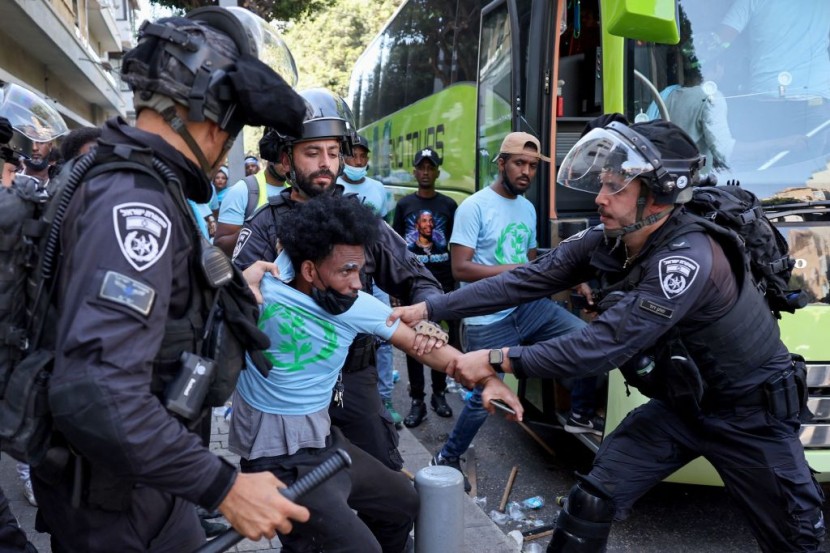
Benjamin Netanyahu, the Prime Minister of Israel, has issued a fervent demand for the immediate expulsion of individuals involved in the violent riots in Tel Aviv involving migrants from Eritrea.
The violence, which broke out between supporters and opponents of the regime of the African nation, resulted in the injuries of scores of people and sparked a critical debate about Israel's policy regarding African migrants currently living within its borders, as per the New York Times.
Netanyahu Calls for Immediate Deportation
The confrontations on the streets of south Tel Aviv escalated to alarming proportions as both sides held construction timber, metal shards, and rocks during the fighting there. The majority of the damage was done to storefronts and police vehicles, which prompted Israeli riot cops to use tear gas, stun grenades, and live rounds of ammunition.
In the wake of this upheaval, Netanyahu called a special conference of the cabinet ministers to discuss the fallout and devise a comprehensive plan of action. Netanyahu stated his position during the meeting, saying, "We want harsh measures to be taken against the rioters, including the immediate deportation of those who took part."
He then signaled a fundamental shift in policy by demanding complete plans for the deportation of the country's African migrants from his ministers, who he had instructed to report back to him. Israel has long struggled with roughly 25,000 African migrants, most of whom originate from the countries of Sudan and Eritrea and claim to have fled repression and conflict in their home countries.
On the other hand, the Israeli government has shown reluctance to oblige asylum seekers, instead classifying them as economic migrants. With the help of this classification, Israel has established that it is under no legal obligation to offer asylum to the individuals in question, according to Daily Mail.
Israel's Varied Strategies to Encourage Voluntary Departure of Migrants
Throughout the years, Israel has used a variety of strategies to encourage migrants to leave freely. These strategies include detaining some migrants in jails that are located in distant areas, withholding a portion of their salaries until they agree to go, and providing monetary incentives to migrants who are willing to move to other countries in Africa.
However, these restrictions have been met with criticism, and the discussion regarding how migrants are treated in Israel continues to be controversial. One of the most significant points of disagreement is that, according to international law, Israel is prohibited from forcefully expelling migrants to countries where there is a risk to their lives or freedom.
In response to the recent violence, Netanyahu expressed confidence that deporting Eritrean government supporters would not be a problem. He said this in response to the fact that the clashes had occurred. However, the ramifications of such deportations in terms of ethics and practicalities continue to be disputed.
The members of the opposition in the Knesset have expressed their concern regarding Netanyahu's response to the violence, and they have been pressing him for specifics regarding the destination of the refugees who would be deported. The complexity of this matter extends beyond immediate concerns about safety to include questions about the humanitarian implications of deporting particularly vulnerable communities.
Additionally, political tensions within Israel have been stoked due to Netanyahu's demand for rapid deportations. While the far-right coalition that makes up Netanyahu's government is adamant that instigators and ringleaders should be deported, they blame the Supreme Court for thwarting earlier deportation attempts.
Members of the opposition in the Knesset claim that successive governments have been unable to adequately solve the situation with migrants, and they highlight the fact that the issue is fraught with political ramifications. Paul Brennan, reporting for Al Jazeera from West Jerusalem, notes in his observations that lawmakers from a wide variety of political persuasions have expressed their opinions regarding the issue.
"There's politics involved in this," he says, underlining that Netanyahu's approach appears to be driven by a desire to be perceived as taking decisive action. "There's a political element involved in this," he emphasizes.
The tension between Israel's security concerns, humanitarian considerations, and its commitments under international law continues to pose a serious obstacle as the country struggles to address the complicated problem of African migrants living within its borders.
This sensitive subject has been thrown into the spotlight due to the recent violence in Tel Aviv, causing Israel to wrestle with the way forward in addressing the presence of its African migrant population, Al Jazeera reported.
© 2025 HNGN, All rights reserved. Do not reproduce without permission.








